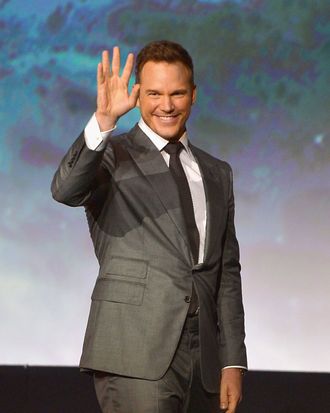
Gratuitous shirtless scenes are a staple of most Marvel movies, and Guardians of the Galaxy Vol. 2 continues the skin-baring tradition. “Kevin Feige has a rule” that they’re mandatory, director James Gunn joked Thursday at the Guardians press conference in Los Angeles. But when a reporter asked star Chris Pratt how he felt about his own shirtless scenes and whether he thinks there’s a double standard in how we treat men and women who are objectified onscreen, Pratt was nothing if not honest.
“Hasn’t hurt my career!” he said, smiling. “We are objects. It’s true, we are. We’re props. They shine a light on us, they paint us up with makeup, and they take a camera and point it at us. Half the time, what ruins it is us talking.”
Pratt became a major movie star after slimming down for the first Guardians film and has kept his body in tip-top shape, recently baring all in his winter bomb Passengers. He told the journalist he has no issue with taking off his clothes. “I would say that objectification is good for me because when I turned my body into an object that people liked, I got paid a lot of money,” Pratt said. “My kids can go to college because I’m an object.”
Still, he paused: “As a man, I can say that.” Pratt noted that objectified women in Hollywood have it far worse, and are offered fewer great roles to prove they’re more than just a body. “I have to be careful because for generations — for millennia — women have been objectified in a way where there’s a pretty horrifying past. So that’s a little bit different, and there probably is what you’d call a double standard, but I think you have to deal with them separately because there’s a history of objectification [with women] that is a sensitive issue.”
“It’s not about being sexually attractive or thought of as a beautiful object,” Gunn interjected. “It’s about the fact that many women in films today are reduced to being only that. When Chris Pratt looks beautiful onscreen, or Chris Evans looks beautiful onscreen … in all honesty, people take that in [stride] and then they still go, ‘But what’s that guy like? What’s his personality?’”
“Chris Pratt is great because he’s funny and he’s sexy and he’s got this vulnerable side — there’s all these different attributes about him,” the director continued. “Whereas men take these women and all that they’re [reduced to] is this one aspect of themselves, that they’re sexual beings. Everything else about their personalities is negated. That’s the really difficult thing, and why it isn’t exactly a one-to-one thing between men and women being objectified.”
Gunn hopes that Guardians 2, which adds Nebula (Karen Gillan) to the titular team alongside her sister Gamora (Zoe Saldana) and introduces kooky telepath Mantis (Pom Klementieff) as well as imperious ruler Ayesha (Elizabeth Debicki), can prove that female characters are more than mere window dressing in comic-book movies.
“One of the things we’ve tried to do with the Guardians films is to allow women to be full characters,” said Gunn. “The character of Mantis in the movie, one of the reasons why people love that character … is that she’s as funny and goofy and weird as Drax and Rocket and our goofy male characters. That’s a way to combat those stereotypes about what a male and a female actor can be.”
“It’s a really interesting question, but it has to be about context,” added Debicki, best known for her roles in The Great Gatsby and The Night Manager. “For me as an actress, whenever I’ve made the choice to do something [that skirts objectification], it’s always about the context we’re shooting it in, about the story, about what you’re trying to say … I certainly don’t take it with a grain of salt.”
That said, Debicki was glad that for Guardians 2 she got to wear striking gold armor instead of the comic-book character’s skintight swimsuit. “It is lovely to play Ayesha because she’s powerful and she keeps all her clothes on,” said Debicki. “Sometimes a lot of heavy clothes!”

